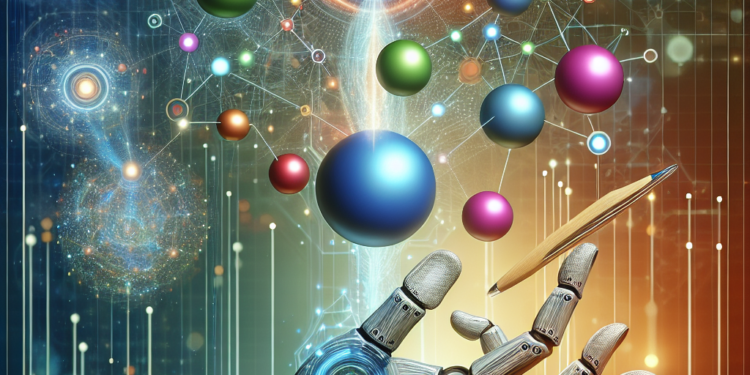AI (Artificial Intelligence) has revolutionized many industries, including project management. By utilizing AI tools and techniques, project managers can streamline processes, improve efficiency, and enhance decision-making capabilities. In this article, we will discuss some AI tricks that can help project managers achieve better project management outcomes.
1. Predictive Analytics
Predictive analytics is a powerful AI tool that can enable project managers to forecast future project outcomes based on historical data and patterns. By analyzing past project data, AI algorithms can identify trends, patterns, and potential risks, allowing project managers to make informed decisions and take proactive measures to avoid potential problems.
For example, predictive analytics can help project managers predict project delays, budget overruns, and resource shortages. By leveraging this information, project managers can adjust their plans, allocate resources more effectively, and mitigate potential risks before they escalate.
2. Automated Task Management
AI-powered task management tools can help project managers streamline task assignment, tracking, and monitoring processes. By automating routine tasks such as task assignment, scheduling, and progress tracking, project managers can free up valuable time and resources to focus on more strategic activities.
Moreover, AI task management tools can help project managers identify bottlenecks, allocate resources more efficiently, and optimize task schedules to improve project efficiency and productivity. By automating repetitive tasks, project managers can increase operational efficiency and reduce the risk of errors and delays.
3. Intelligent Resource Allocation
AI-based resource allocation tools can help project managers optimize resource allocation decisions by analyzing project requirements, team availability, and skill sets. By leveraging AI algorithms, project managers can match the right resources to the right tasks, improve team productivity, and minimize resource wastage.
Moreover, AI tools can also help project managers identify potential conflicts or overutilization of resources, enabling them to make timely adjustments and prevent resource shortages or bottlenecks. By adopting AI-based resource allocation tools, project managers can enhance workforce utilization, improve project outcomes, and drive overall project success.
4. Dynamic Scheduling
AI-powered scheduling tools can help project managers create dynamic project schedules that automatically adjust to changing project requirements, resources, and constraints. By leveraging AI algorithms, project managers can optimize project schedules, allocate resources more effectively, and react quickly to unexpected changes or disruptions.
Furthermore, AI scheduling tools can help project managers identify potential schedule conflicts, dependencies, and constraints, enabling them to make informed decisions and adjustments to ensure project deadlines are met. By adopting AI-based scheduling tools, project managers can improve project planning, execution, and delivery timelines.
5. Real-time Monitoring
AI-based project monitoring tools can provide project managers with real-time insights into project progress, performance, and potential issues. By leveraging AI algorithms, project managers can track key project metrics, identify deviations from the plan, and take proactive measures to address potential risks or delays.
Moreover, AI monitoring tools can help project managers automate reporting processes, generate real-time dashboards and alerts, and facilitate communication and collaboration among project team members. By utilizing AI-based project monitoring tools, project managers can improve project visibility, enhance decision-making capabilities, and ensure project success.
6. Predictive Maintenance
AI-driven predictive maintenance tools can help project managers optimize maintenance schedules, prevent equipment failures, and minimize downtime. By analyzing historical maintenance data, AI algorithms can identify patterns, trends, and potential failure modes, enabling project managers to predict and prevent equipment breakdowns before they occur.
Moreover, AI predictive maintenance tools can help project managers prioritize maintenance tasks, allocate resources efficiently, and extend the lifespan of equipment. By adopting AI-based predictive maintenance tools, project managers can reduce maintenance costs, improve equipment reliability, and enhance project performance.
7. Risk Analysis
AI-based risk analysis tools can help project managers identify, assess, and mitigate project risks by analyzing historical data, project parameters, and risk factors. By leveraging AI algorithms, project managers can quantify risks, prioritize mitigation measures, and develop risk mitigation strategies to minimize potential impacts on project outcomes.
Moreover, AI risk analysis tools can help project managers forecast potential risks, assess their likelihood and impact, and provide real-time risk alerts and notifications. By adopting AI-based risk analysis tools, project managers can improve risk management practices, enhance decision-making capabilities, and increase project success rates.
8. Resource Forecasting
AI-powered resource forecasting tools can help project managers predict future resource requirements, identify potential shortages, and optimize resource allocation. By analyzing historical project data, resource utilization patterns, and project parameters, AI algorithms can forecast resource needs and recommend resource allocation strategies to maximize efficiency and productivity.
Moreover, AI resource forecasting tools can help project managers anticipate changes in resource demand, track resource availability, and prevent resource shortages or overutilization. By utilizing AI-based resource forecasting tools, project managers can improve resource planning, optimize resource allocation, and enhance project performance.
9. Intelligent Decision Support
AI-powered decision support tools can help project managers make informed decisions by analyzing project data, trends, and performance metrics. By leveraging AI algorithms, project managers can receive real-time insights, recommendations, and suggestions to guide decision-making processes and improve project outcomes.
Moreover, AI decision support tools can help project managers evaluate different scenarios, simulate potential outcomes, and assess the impact of decisions on project performance. By adopting AI-based decision support tools, project managers can enhance decision-making capabilities, optimize project strategies, and drive project success.
10. Chatbots for Project Management
AI-powered chatbots can help project managers automate routine communications, provide instant responses to queries, and streamline information exchanges within project teams. By utilizing AI algorithms, chatbots can offer project updates, answer questions, assign tasks, and facilitate collaboration among team members.
Moreover, AI chatbots can help project managers improve team engagement, increase productivity, and enhance communication and cooperation among project stakeholders. By integrating AI chatbots into project management processes, project managers can improve team dynamics, foster collaboration, and drive project success.
In conclusion, AI tools and techniques can help project managers achieve better project management outcomes by enabling them to predict project outcomes, automate tasks, optimize resource allocation, enhance decision-making capabilities, and improve project performance. By adopting AI tricks for project management, project managers can streamline processes, increase efficiency, and drive project success.













